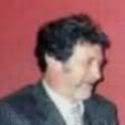Scottish Esperanto Study Weekend 2008: Report
The programme began with a “Language Seminar” in which Professor John Wells spoke about the suffix “um” and how it can be used. There followed a lively discussion amongst the participants. The session was interesting and informative.
By contrast to other Study Weekends we didn't wait until the afternoon before going on our excursion. At 11am the “students” set off to nearby Bridge of Allan, which is only one stop away by train. First we went to the Parish Church of Bridge of Allan to see the furniture and decorative organ panel designed by the famous Glasgow Architect Charles Rennie Mackintosh. The church curators kindly served us with tea and biscuits before the tour. Next we went to the local brewery for another tour. Unfortunately the brewery, which is being restored, had still not re-opened. Instead the owner entertained us with an interesting description of his beers and with samples of the said! The lunch of soup and sandwiches was welcome when it came.
After visiting the town a group of participants met under Jack Casey's guidance. Jack asked the group to write something about their “Favourite Thing”: experience, book, film, personality and so on. After enough time to think about the theme and to write something, each participant read out what they had written to the rest of the group. This was an interesting and enjoyable event.
Before dinner John Wells spoke about the island Montserrat. Illustrating his talk with slides he discussed the history and economic state of the island during the eighteenth century. He described the sugar plantations and the slaves who worked there. The island was under British rule during the seventeenth century when the slaves were imported from West Africa, but during the American Revolution France drove the British out. The island was returned to Britain under the treaty of Paris and in 1834 the slaves were liberated.
In 1989 a hurricane hit the island and in 1995 the vulcano erupted and caused great destruction in the South of the island. Many islanders left Montserrat because there was no more work or even homes for them to live in. Nowadays the main source of income is tourism.
After dinner Andrew Weir lead a discussion on “Nationalism, Internationalism and Non-Nationalism”. He introduced the hour with a summary of the three contributions to the debate so far: the first from David Kelso who spoke on the theme during the Study Weekend last year; the second by a mysterious “Internationalist” who wrote in “Esperanto en Skotlando”; the third by Girvan McAoidh who also wrote in “Esperanto en Skotlando”. When Andrew opened the discussion to the floor plenty of participants hit the point very well with their contributions. It was finally revealed that “Internationalist” was our own Ed Robertson.
Duncan Thomson closed Saturday's programme skilfully leading a game on word definitions. In four teams we had to think of a believable definition for a really obscure word picked by Duncan from PIV. Duncan then collected the definitions and read them out along with the correct one. Teams would gain one point if another team picked their definition and three points if they identified the correct definition. After several words Duncan added up the totals. The team which most often picked the correct definition and most often tricked the other teams by their definition would win. Unsurprisingly the team with our visiting dictionary writer won!
Sunday 7th September
Professor John Wells began the day with another Language Seminar. Using diagrams he taught us about the organs of speech and the classification of consonants. He spoke about voicing and the place and manner of articulation, which together uniquely form the sounds of speech.
After the coffee break Ed Robertson spoke about Esperanto Etymology and gave out to the participants sheets with a list of Esperanto words in one column and a list of source languages in the adjacent column. The “students'” task was to pair up each word with the language it came from. There was variable success amongst them!
The Religious Service and the Alternative took place after lunch. David Kelso lead the Alternative in the topic “Spirituality”.
During the two Language Seminars of Professor Wells and Ed Robertson's item on etymology, Hugh Reid took lessons for beginners. He took as a model the structure of the lessons from the CD's of a well known language teacher which have had great success in the rapid acquisition of languages. The experiment seemed to be successful.
The Study Weekend finished with the meeting of the committee of the Scottish Esperanto Association.
Hugh Reid
